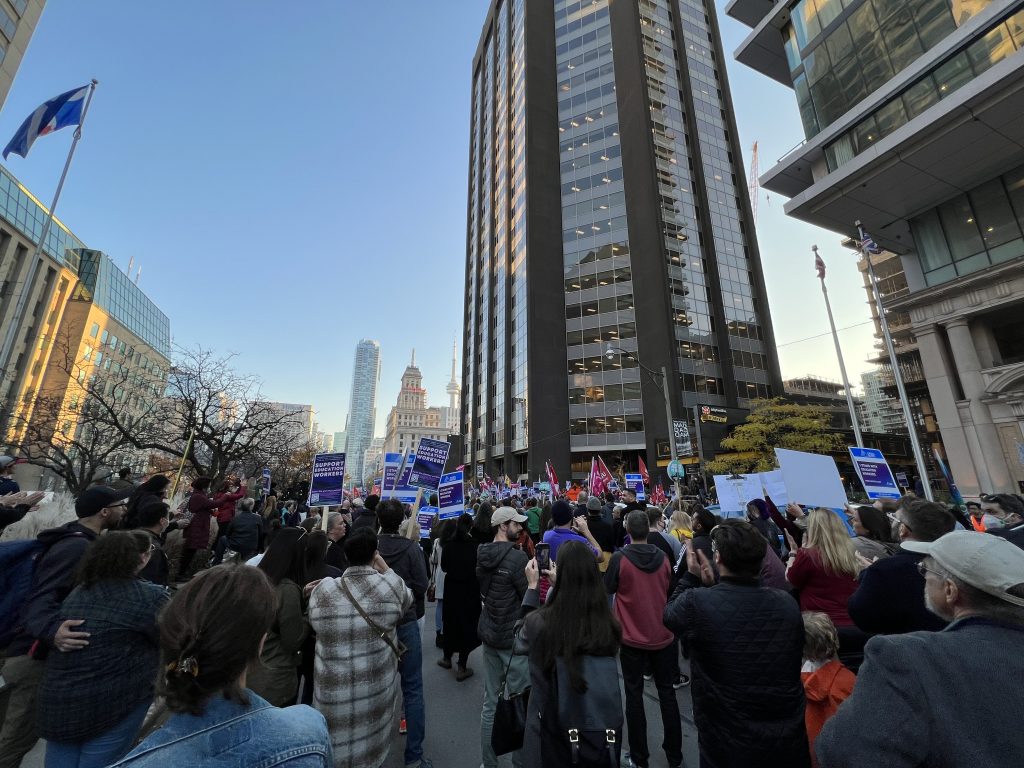We all lose when the public sector unions lose

Last Monday, November 21, the Ontario School Board Council of Unions (OSBCU) bargaining team averted a strike by 55,000 members of the Canadian Union of Public Employees (CUPE) when they agreed to bring a government offer to the union membership. The media relief was palpable, and many parents celebrated that schools would be open on Monday.
Media outlets from CTV to the National Post called this offer a “tentative deal.” But this is not a deal, and it is certainly not a win. Nothing is a deal until it has been ratified by union membership; until then, it is merely an offer. Already calling this offer a deal, and acting as though everything has been resolved, places the onus on union members to ratify the offer or else be blamed for being “greedy” and “selfish.”
The Ford government, and all other employers, benefit from phrases like “tentative deal”, because they create a narrative where it is the union members who, by rejecting the “deal”, are the ones in the wrong—the ones at fault for disrupting production and inconveniencing parents. This social onus on unions to maintain industrial peace is literally encoded in our labour laws. Our Wagner-style regime of labour law is structured so as to best enable production to continue: the fundamental aim of the Ontario Labour Relations Act, 1995 and Crown Employees Collective Bargaining Act, 1993 is the quick resolution of disputes and maintaining the flow of commerce.
OSBCU’s President, Laura Walton, stated that the government’s offer is inadequate and that she was forced to present the deal to membership because the government refused to negotiate—they were “not willing to budge any further.” CUPE stated that, if ratified, the agreement would provide, on average, a 3.59 percent annual wage increase for its members. Given that inflation in Ontario is almost 7 percent and rising, this is still a yearly pay cut.
Union members began voting on November 24. But even if the membership votes to ratify, the fight to protect workers’ rights in Ontario will be far from over. Bill 28—the Keeping Students in Class Act, 2022, which invoked the notwithstanding clause to make it illegal for education workers to strike, and was quickly repealed due to near-universal backlash—was just the latest in the Ford government’s attacks on public sector unions and on workers’ rights. Unions and associations across the province have already united to fight Bill 124, the law which caps public sector compensation increases (including benefits) at one percent a year for the next three years. They rightly brought an action that Bill 124 is unconstitutional because it effectively removes unions’ right to bargain. After all, if public sector unions can only bargain for increases of up to one percent, how is that even bargaining?
By defunding the public sector via the one percent increase cap, refusing to acknowledge the value of public employees’ work by paying them an inflation-sensitive wage, and flagrantly using the notwithstanding clause, the Ford government has shown that it is openly testing workers’ willingness to fight to protect their rights.
Bill 28 and the CUPE crisis are just the beginning. Next it will be healthcare—an area already in crisis from underfunding, worker exodus, and privatization. And these threats to workers’ rights have the potential to further undermine our fragile labour/employment system. Our labour laws do not place unions on equal footing with employers. The stringent statutory hurdles unions must overcome in order to be in a legal strike position; the ban on wildcat, sympathy, political, and untimely strikes; and the Ontario Labour Relations Board’s very permissive understanding of what counts as a strike, all reduce unions’ practical power. This is not even to mention the situation of millions of workers who lack rights because they are not unionized, are not considered employees, or are migrant and undocumented workers.
We as a society need public sector unions to win, because they fight for rights that benefit all of us. Unions, and the pressure they exerted on past governments, are the only reason Ontarians enjoy the many employment protections and norms we do. When Canadian Union of Postal Workers workers struck for maternity leave in 1981, they were called greedy; when they won, it was a win for workers across Canada. When in 1872 the Toronto Typographical Union went on strike for a nine-hour workday (nine! hours!), the strike leaders were arrested, but their demands legalised the right to strike and changed what workdays and labour relations looked like for the better. Unions are crucial to giving employees greater power against their employer, and to giving them access to arbitration. When united, unions are a powerful vehicle to fight for change.
Public sector unions are the front line in Ford’s battle to erode workers’ rights. Their losses are losses for all Ontarians. If we do not support them and do not stand with them in their fight, we will fall with them.





